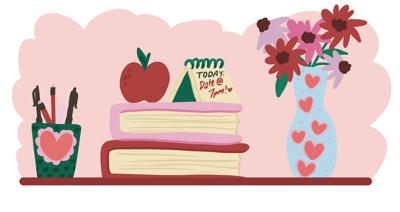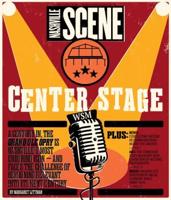
I learned at a young age that it was much more fun to get ready for the school dance than to actually attend it. I loved shopping for an outfit, meticulously following a YouTube tutorial for a smoky eye, taking pictures on the staircase of my friend’s house, imagining what song I’d request (One Direction, of course), imagining scenarios in which my crush asked me to dance.
When he didn’t, I felt distraught. My throat felt tight and tears welled in my eyes. But afterward I took off my shoes and sprinted across the soccer field to a friend’s house, where her mom had made spicy pretzels for us. We were all a bit disappointed but didn’t feel the need to articulate it. We counted the bobby pins in each updo and played MASH and made prank calls into the wee hours.
Dating can feel like that. It’s fun to have a crush, to make plans, to imagine how this date could be the last first date you ever go on. Often it’s disappointing. You just don’t click with a person, or you don’t find them attractive, or your values don’t align. Only now, as an adult, there’s not always someone there to soften the blow with a pretzel or a prank call — there aren’t always friends who just had the same experience.
I spoke with six Nashville singles and a few friends about what it means to date in Music City.
In Nashville, you have a good chance at dating a musician, if that’s what you fancy. There’s also a decent chance you’ll run into that musician out and about. The saying that “Nashville is a small town” is especially true in the dating world. You’re sad they go on tour; later, you wish they would.
One young Jewish woman is contemplating opening up to long-distance relationships, concerned that the pool of fellow Jewish singles is too small here.
Another young woman studied dating apps as part of her degree at Vanderbilt University. She’s taking part in her own social experiment: posting a profile including only pictures of herself in a very specific Halloween costume. (Old Gregg from the cult British comedy The Mighty Boosh. It is not a sexy costume.)
A nonbinary bisexual person is setting up dates for the first time since transitioning, finding comfort in the fact that those who swipe right on them know about their queerness and (hopefully) accept it. But they still worry about safety. They suggest not flirting with the barista — “don’t shit where you eat.”
A man new to the sober dating world figures out how to date what he calls “more intentionally” without need for liquid courage.
One recent divorcee is figuring out the rules of dating: how long until it’s official, and when to delete the apps that got them here to begin with?
One man with autism hopes to find someone understanding as he navigates his later-in-life diagnosis. As a caretaker for his mother, he tries to balance caring for her and leaving time for a new connection. He met his previous wife while voting at a polling location, but now, apps allow him to communicate at his own pace and in his own way.
Another divorcee is trying the apps for the first time as an introvert, which requires taking some breaks. She’s moving away to Seattle. That’s another thing — Nashville, for many, is a transient city.
A friend wants men to see her as human, to see her as a viable option as a plus-size person. Another just wants a new crush to help bide the time.
We singles are doing our best to stay hopeful. We get to look forward to the time when the date, like the dance, can feel better than the anticipation and debriefing.
This issue is about the liminal space, waiting for a big event to happen — LOVE. And if it’s already happened for you, I’d appreciate it if you could supply some snacks.
From dating as a reverend to surviving in a post-dating-app society and picking the right spot for a first date






